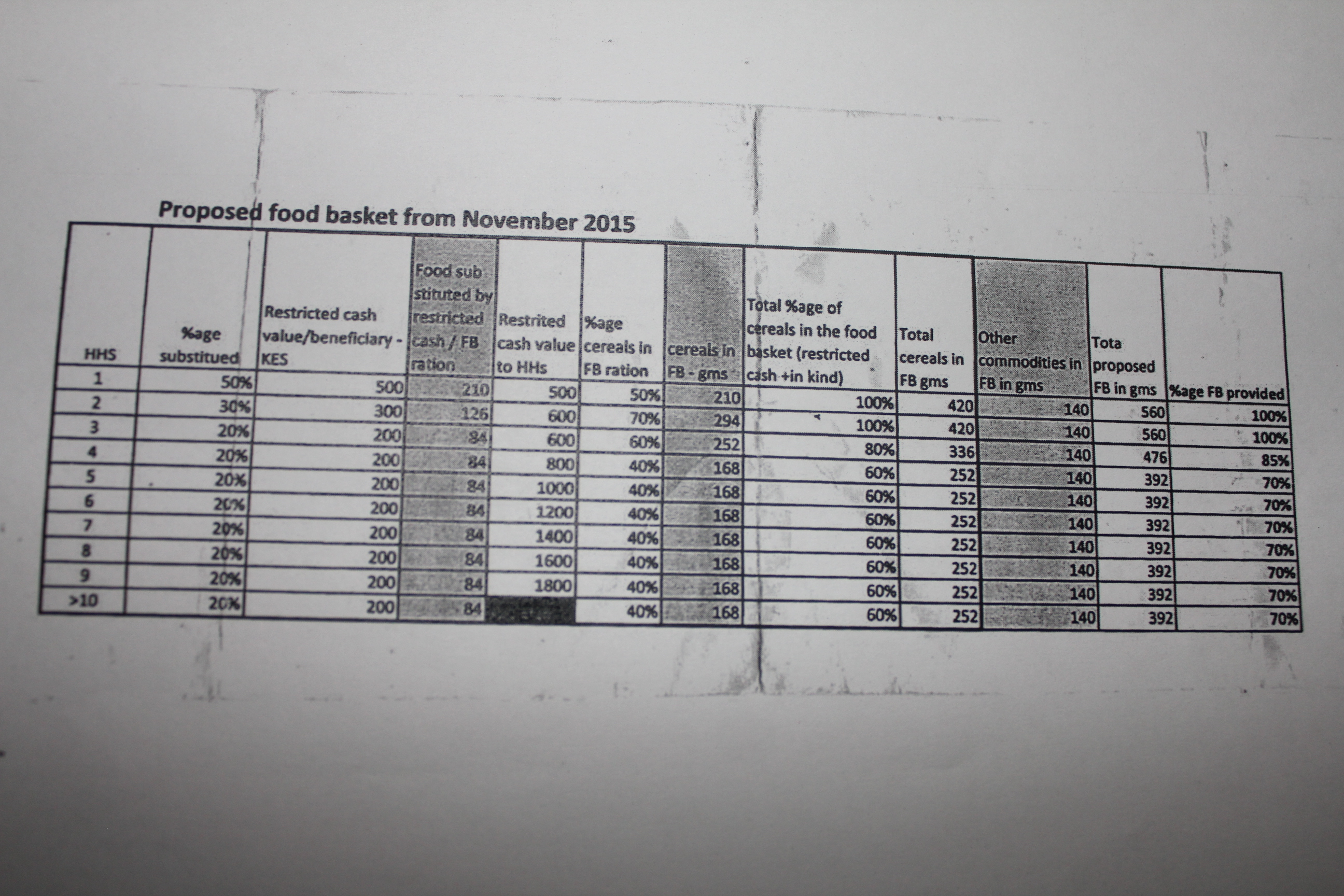The introduction of Bamba Chakula has resulted in vulnerable refugees who don’t have cell phones missing their cash vouchers.
Bamba Chakula is a Swahili expression for take away food, in the form of money deposited in one’s own Systematic Identification Memory (SIM) Card. The SIM system was introduced in mid 2015 as a new approach to food distribution in both Kakuma and Dadaab refugee camps in Kenya. Refugees receive a certain proportion of their ration as actual food, and the remainder as credit on the SIM card. This approach to provision of food is intended to avoid food wastage among other benefits.
To benefit from the new system, refugees and asylum seekers must undergo a biometric check where every refugee’s fingerprint must be verified in order to collect food rations.

At the start of the Bamba Chakula program, refugees were given 100 Kenyan shillings ($1) as 50% of a month’s ration for a single person. Refugees protested about it because they claimed that 100 Kenyan shillings is not equivalent to 50% of the actual rations. Therefore, WFP responded by increasing the cash voucher for family size one to Ksh500 ($5). However, for a family of two, Ksh300 were given per person and for a family of three or more, only Ksh 200 were given per person, equivalent to 20% of their entire rations for the month.
Consequently, many refugees in Kakuma did not accept this approach by the food providers in the camps (mainly the World Food Programme). Refugees protested over inadequate allocation in the amount of food divided between cash voucher and rations. For instance 50% was given as cash value while the remaining half was given as solid food. Therefore, there have been continued protests about the Bamba Chakula program with inconsistency in the distribution mechanism of the food with pretext of provision of the “cash voucher” which the beneficiaries claim is not beneficial to them.
Challenges of Bamba Chakula
The beneficiaries are required to have an extra phone in order to insert the Bamba Chakula SIM Card. Here a refugee is required to receive a Short Message Service (SMS) through the Safaricom (Network Service provider) in order to activate the individual SIM cards. In Kakuma there are thousands of refugees who don’t own cell phones. For instance 50% of new arrivals don’t have cell phones.
Secondly, during the initial phase, WFP sent secret PINs to every head of the family whose SIM Cards have been registered, but WFP failed to create awareness about the activation of the SIM Cards and how to safely store the secret PINs. At this stage, many of the refugees deleted their “inbox” SMS’s which contained the secret PINs without knowing, with the result that they missed the cash voucher.
Thirdly, thousands of the beneficiaries were not able to receive Bamba Chakula vouchers at the designated Bamba Chakula shops within the camps. There are delays at the shops because the traders are not well trained in the new system.
Fourthly, a thousand or so of the refugees thought that the PINs were only meant for a particular phase of the Bamba Chakula distribution, so upon receiving their vouchers, they deleted the text messages which contained the PINs so they could not receive monthly based Bamba Chakula value.
Fifthly, other thousands of beneficiaries in the camp do not own mobile phones so they received their secret PINs through their friends’ or neighbours’ phones. Therefore, they lost their secret PINs through the swapping of the SIM Cards. Consequently, they encountered a challenge thus they were not able to receive their Bamba Chakula voucher on the next cycle of distribution.
Solution
In order to solve many complaints that refugees have raised in the new system of the cash voucher and the several protests held in the camp, WFP opened customer care at the Food Distribution Centres where registration and data collection take place. On Fridays they work to solve the problems that are recorded throughout the week. Therefore, on every Friday mobile phones must remain active with the Bamba Chakula SIM Cards inserted in the phones for not less than 24 hours in order to receive an SMS which could contain either a new PIN or Bamba Chakula value or both.
However, thousands of refugees in Kakuma who don’t own cell phones remain at great risk because they could not receive cash vouchers since the new system of food distribution was initiated in August, 2015.

1 reply on “Dilemma of new food distribution mechanism”
[…] Dilemma of new food distribution mechanism | Kakuma News Reflector – A Refugee Free Press […]